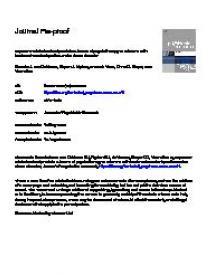Exposure-related cortisol predicts outcome of psychotherapy in veterans with treatment-resistant posttraumatic stress disorder
Background
Hypothalamic-pituitary-adrenal axis functioning has been related to treatment outcome in posttraumatic stress disorder (PTSD). Previous studies have primarily focused on cortisol levels before and after a course of therapy and findings have not been fully consistent. This study investigated session-related cortisol levels in veterans with treatment-resistant PTSD over the course of a novel motion-assisted virtual reality exposure therapy and aimed to determine whether cortisol levels were related to changes in PTSD symptom severity.
Methods
Veterans (n=22) received 6 exposure sessions during which salivary cortisol samples were collected pre-session, post-session and in the late afternoon following sessions. PTSD symptom severity was assessed by structured clinical interviews at pre- and post-treatment. Average cortisol levels were compared between responders and non-responders. Linear regression analyses were conducted with PTSD symptom change as criterion variable, average cortisol levels as predictor, and timing of sampling and baseline PTSD symptoms as covariates.
Results
Responders to treatment tended to have higher average cortisol levels at pre-session (p=0.064) and post-session (p=0.050) compared to non-responders. Higher average pre-session and post-session cortisol levels predicted greater PTSD symptom improvement (pre: b=-1.83, p=0.009; post: b=-3.57, p=0.004).
Conclusion
This study provides preliminary evidence for session-related cortisol as biomarker of response to exposure-based therapies for PTSD. Higher cortisol levels may have facilitated fear extinction and reconsolidation, and may indicate increased physiological stress activation necessary for appropriate treatment engagement. Further work involving comparable methodology is encouraged to establish session-related cortisol as biomarker and to determine the mechanisms through which it interacts with treatment outcome.
Geachte bezoeker,
De informatie die u nu opvraagt, kan door psychotraumanet niet aan u worden getoond. Dit kan verschillende redenen hebben,
waarvan (bescherming van het) auteursrecht de meeste voorkomende is. Wanneer het mogelijk is om u door te verwijzen naar de bron
van deze informatie, dan ziet u hier onder een link naar die plek.
Als er geen link staat, kunt u contact opnemen met de bibliotheek,
die u verder op weg kan helpen.
Met vriendelijke groet,
Het psychotraumanet-team.
In: Journal of Psychiatric Research : ISSN : 0022-3956 | 130 | november | 387-393
https://doi.org/10.1016/j.jpsychires.2020.08.011
Open Access


